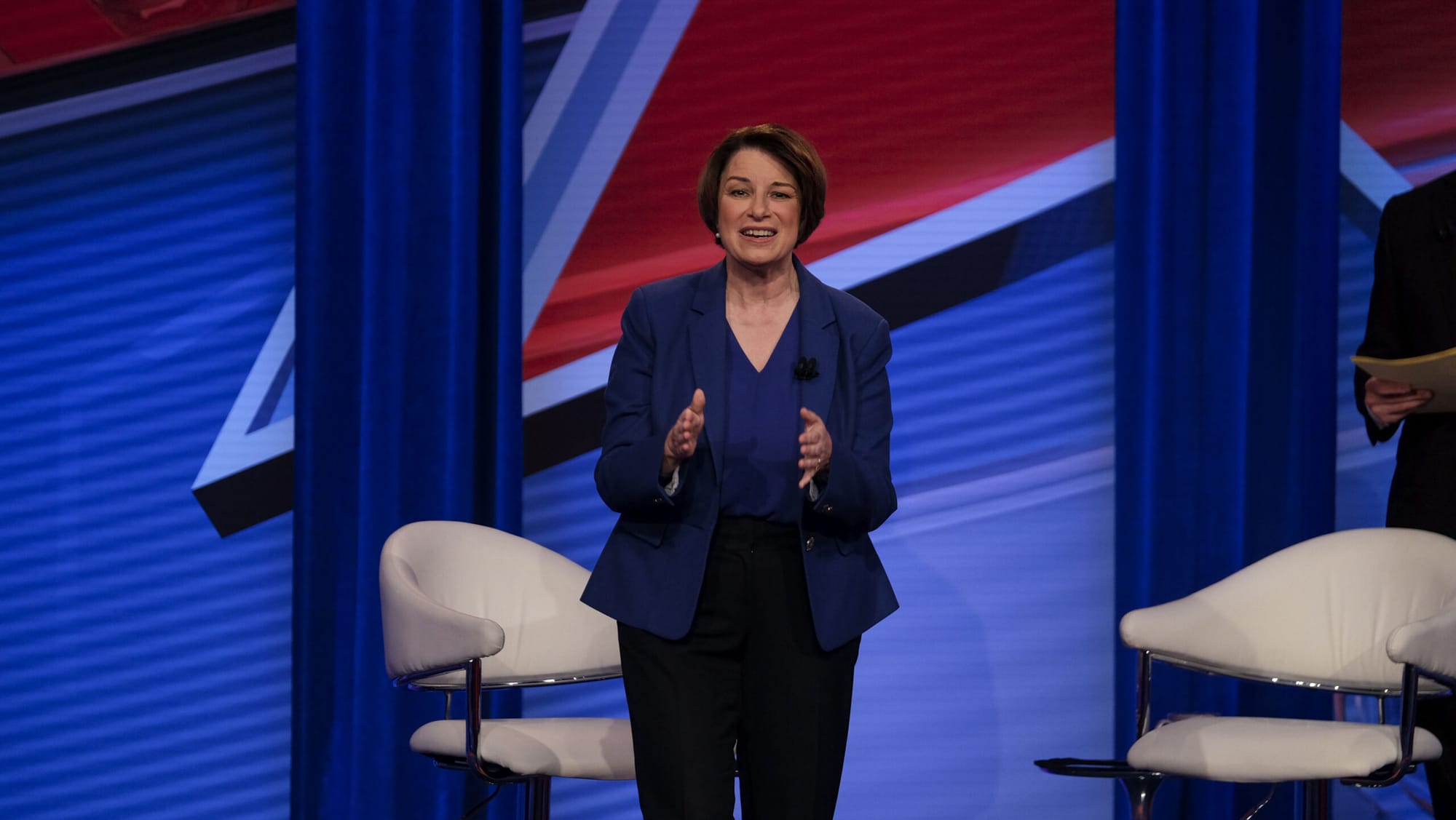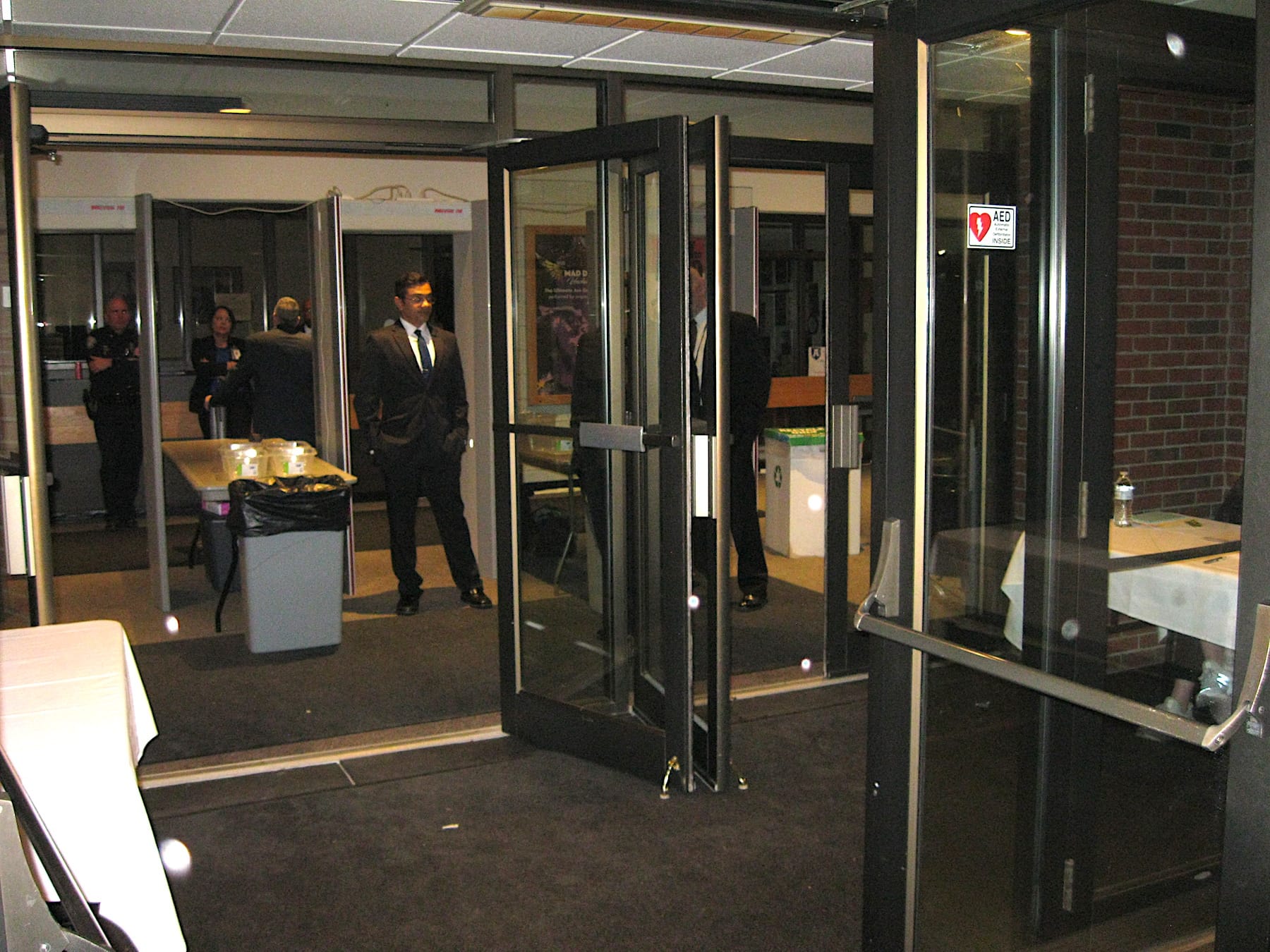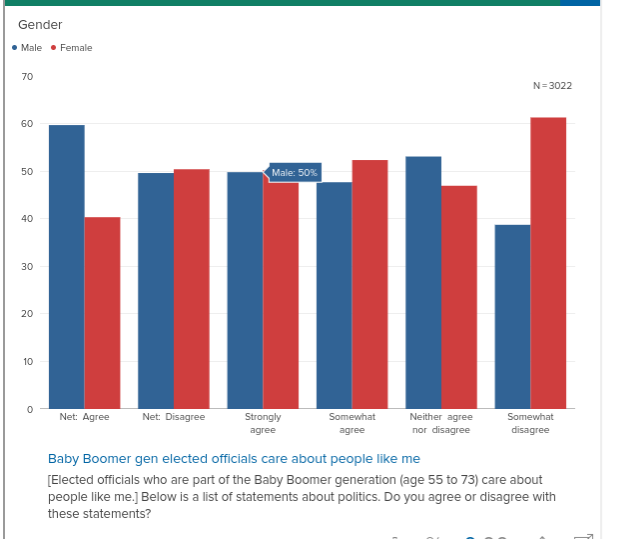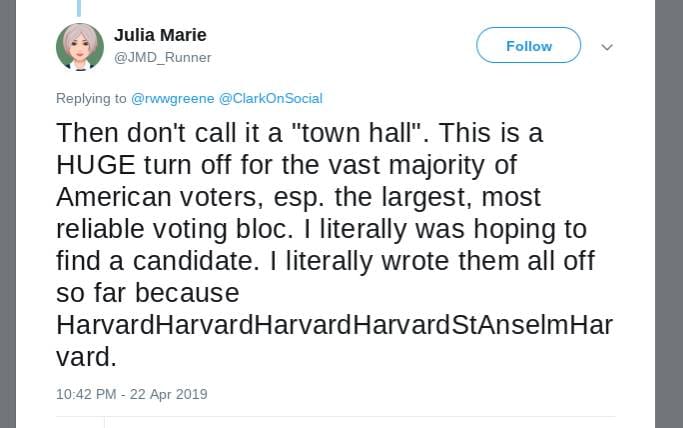Election 2020: It’s the boomers turn to be too old to be trusted
CNN and Harvard’s IOP doubled down on this idea for Monday night’s Town Meeting, orientating the event to young voters and packing the room with 500 students, about half of them from Harvard University. This did not go unnoticed by people commenting on the event on Twitter.


MANCHESTER, NH – Jack Weinberg was 24 when he accidentally coined the phrase “don’t trust anyone over 30.” The year was 1964, and while Weinberg back-pedaled for years about what he actually meant by it, the line was turned into a rallying cry: Prior generations don’t have your back.
Poet Allen Ginsberg maybe did it better a decade earlier in his poem “Howl,” comparing the Boomers’ parents to Moloch, a demon who offers prosperity in return for child sacrifice.
What comes around goes around.
The Harvard University’s Institute of Politics (IOP) – co-organizer of Monday’s CNN Town Hall at Saint Anselm College’s Dana Center – released the results of its annual Youth Poll earlier in the day. Only 16 percent of the respondents to the survey, given to more than 3,000 voters age 18-29 nationwide, believe elected officials from the Baby Boomer generation care about them. Only 18 percent of those respondents said Baby Boomers who vote –that’s you, Mom – care about them. There is, say the survey organizers, a generational conflict brewing between young voters and Baby Boomers.

For those counting, that should take Joe Biden, Elizabeth Warren, and Bernie Sanders off young voters’ best-of lists, but it does not. Earlier this month, Harvard’s IOP released a poll that showed 31 percent of voters 18-29 supported Sanders and 20 percent favored Biden. Warren didn’t make the top three; that position went to Beto O’Rourke at 10 percent of respondents.
“Technically neither [Sanders nor Biden] are part of the Baby Boomer generation. I think they’re probably a little bit older than that generation technically, but it’s not a really good technical question,” said John Volpe, the Institute of Politics’ director of polling. “I think that young people are looking for folks who are authentic and whose values and ideologies kind of align with them. And what we’ve seen specifically, the last four or five years, is that the issues that Bernie Sanders has raised have uniquely resonated with younger voters especially those under 30.”
However, Volpe cautioned, it’s early in the primary season, and opinions can change.
“To give you a sense of how incredibly early this is in the 2020 cycle,” he said, “four years ago Bernie Sanders had either one or two percent in the survey. And we know six months later he was he was leading the field and received more votes in the primary than Donald Trump and Hillary Clinton combined. Things can move very very quickly.”
Sanders took 80 percent of the youth vote in the 2016 primaries. In his portion of the Town Hall, Sanders said he was a surprised as anyone when he was adopted by young voters.
“I think that my campaign kind of speaks to the idealism of young people who know that – who understand what’s going on today is not – we’re not where we should be. And young people have a tendency to want to think bigger than older generations,” Sanders said.

Mark Gearan, director of the Institute of Politics, said young voters could be the determining factor in the 2020 election, making up, at that time, a third of the electorate.
“Young voters are eager to be engaged and speak directly to those seeking the presidency,” Gearan said.
CNN and Harvard’s IOP doubled down on this idea for Monday night’s Town Meeting, orienting the event to young voters and packing the room with 500 students, about half of them from Harvard University. This did not go unnoticed by people commenting on the event on Twitter.
Related story: Video: Students react to CNN Town Hall
“Then don’t call it a ‘town hall,’” commented Twitter user @JMD_runner. “This is a HUGE turn off for the vast majority of American voters, esp. the largest, most reliable voting bloc. I literally was hoping to find a candidate. I literally wrote them all off so far because HarvardHarvardHarvardHarvardStAnselmHarvard.”
The candidates – Sanders, U.S. Sen. Elizabeth Warren, U.S. Sen. Kamala Harris, Mayor Pete Buttegieg, and U.S. Sen Amy Klobuchar – came prepared. Warren, earlier in the day, released her plan for student loan debt.,
“I have two parts to the proposal,” she said. “Part one is that we say that we’re going to roll back student loan debt for about 95 percent of students who have debt. That’s part one. And part two is to make sure that we never get in this mess again on student loan debt, and that is to make college universally available with free tuition and fees, and to put more money into Pell grants so that students of color, so that our poorest students have real access to college and that we put real money into our historically black colleges and universities.”
Warren said she’d pay for the plan by putting a two-cent tax on every dollar an individual earns above $50 million.

College loan and tuition relief was common cause among the candidates, with Klobuchar sounding a cautious note. She’s not in favor of free college (except two-year community programs) and loan forgiveness (unless you go into public service or possibly in-demand professions). She would, however, like to expand the availability of Pell Grants and give folks with college debt the opportunity to refinance at three-percent interest.
According to the IOP poll, protecting the environment is “now central to both domestic and foreign policy agendas of young Americans.” Questions directed to the candidates were written by students present, and climate-change came up a lot. None of the candidates denied it exists, they all agreed it was a major problem, and they’re in favor of some kind of Green New Deal.
“I support it because I, to my core, know that the climate crisis is representing an existential threat to who we are as human beings,” Kamala Harris said. “We have had supposed leaders who are buying – and pushing science fiction instead of science fact, and this is to our collective peril if we don’t take this matter seriously with a sense of urgency.”


Another issue young voters are concerned with, according to the IOP poll, with the moral direction of the country. In the 2015 poll, 52 percent of young voters said they were concerned. This year, the number was 61 percent. During the Town Hall, the focus on this issue revolved around President Donald Trump.
“Frankly, our ability, the ability of the next president and of the U.S. in general to lead on this issue – I mean, to really try to guide countries toward doing the right thing, largely depends on whether we have any moral authority at all. Does anybody think right now that the U.S. has an awful lot of moral authority in the world? It has plummeted,” said Buttigieg responding to a question about the U.S. how, as president, he would work with countries that regard homosexuality as a crime or a sin.
Warren went one further, saying it was Congress’s responsibility to take up the question of Trump’s impeachment.
“I took an oath to uphold the Constitution of the United States, and so did everybody else in the Senate and in the House. And I believe that every person in the Senate and the House ought to have to vote and to say either, yeah, that’s OK with me, yeah, let a president just step in the way he did when he told the White House counsel to go fire Mueller, and then told the White House counsel to go lie … ,” Warren said. “If there are people in the House or the Senate who want to say that’s what a president can do when the president is being investigated for his own wrongdoings or when a foreign government attacks our country, then they should have to take that vote and live with it for the rest of their lives.”
For the complete Harvard IOP survey results, click here.





